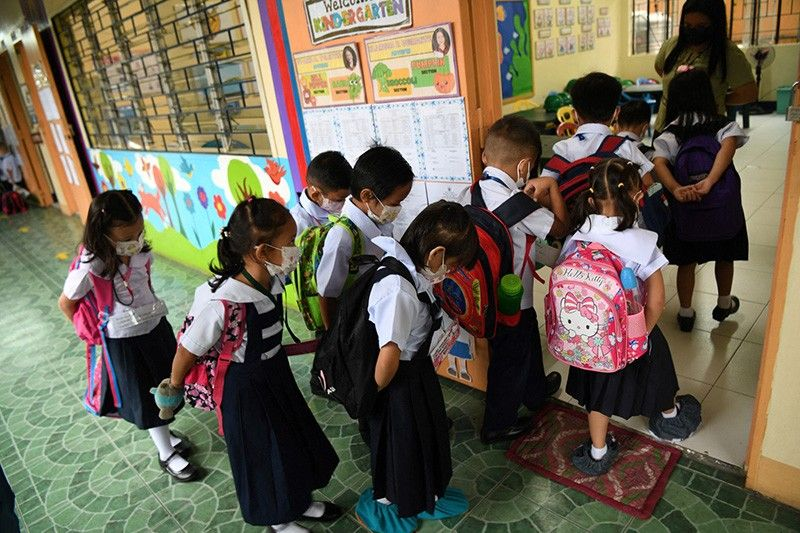https://www.philstar.com/headlines/2024/02/26/2336305/shared-responsibility-deped-told-it-cant-help-special-needs-children-alone

Students wearing face masks form a line as they enter their classroom during the opening of classes at a school in Quezon City, suburban Manila on August 22, 2022 as millions of children in the Philippines returned to school as the academic year started on August 22, with many taking their seats in classrooms for the first time since the Covid-19 pandemic hit.
MANILA, Philippines — House members frustrated over the stalled implementation of a landmark law for children with disabilities two years since its passage have urged the Department of Education to demand other agencies’ help in carrying out the law.
During the House basic education committee’s hearing on Monday, Rep. Roman Romulo, who chairs the panel, said DepEd alone cannot set up full-fledged learning centers for learners with disabilities in every locality, as required by Republic Act 11650, due to the shortage of health professionals who can assess children with special needs.
RA 11650 or the Inclusive Education Act was signed into law in March 2022. It mandates that all municipalities/cities should have at least one Inclusive Learning Resource Center (ILRC) – a physical or virtual one-stop-shop providing special needs students with learning support and free therapy services.
Compared to regular special education (SPED) schools, ILRCs are supposed to go beyond the education of children with disabilities by having a team of health specialists and therapists ready to diagnose and monitor those with special needs.
For this reason, the law assigns specific roles to agencies besides the DepEd, the lead implementing agency. It tasks:
Three years since its passage, DepEd officials told Romulo that it has yet to finalize RA 11650’s implementing rules and regulations (IRR) and the five-year roadmap that will realize the government’s ambitious dream of having one ILRC in every locality, which typically hits a snag due to funding and personnel issues.
“There are things that DepEd should not be shouldering on its own. That is why there is the DOH, LGUs and the Department of Social Welfare and Development (DSWD),” Romulo said in a mix of English and Filipino.
“We need to involve experts from different departments. Teachers should primarily just be teaching and not assessing (children with disabilities),” Romulo added.
Due to the small number of development pediatricians in the country, DepEd Director Leila Areola admitted to relying on the help of LGUs to assess students with disabilities — findings of which are required before they can enroll in SPED schools.
“Ideally, it should be an expert who determines if a student needs to be (in SPED),” Areola said.
Citing her experience as a school division superintendent in Tugueguerao City in Cagayan, Areola shared that their office often had to go to a neighboring city just to find a specialist who could assess the children in her division.
Development pediatrician Bernadette Benitez said during the hearing that there are only 96 development pediatricians in the Philippines — doctors who specialize in providing care for children and adolescents with developmental delays and learning difficulties.
“(But) I would like to add that there are also child psychiatrists and neurologists who can also do assessments. Not just development pediatricians. But we recognize the fact that there are still few of us,” Benitez said.
Children with disabilities face significant barriers to education and health in the Philippines and are often the worst hit by any disruptions to the formal school system.
Data from the Department of Education showed that enrollment of students with disabilities dropped significantly or by 74% during the pandemic after only around 94,000 enrolled in 2021 compared to the pre-pandemic figure of 360,000.
Romulo and Rep. Ciriato Gato (Batanes), chair of the House health committee, said that the law requires a long-term roadmap precisely because of the lack of health specialists in the country catering to children with special needs.
Gato said that the main problem with the stalled implementation of RA 11650 is the lack of professionals who can assess children with special needs and provide advice on the kind of support they need, which can “only come from a qualified and competent professional.”
SPED schools are also limited in scope and, as pointed out by Rep. Steve Solon (Sarangani), sometimes require parents to pay for specialists to assess their children first before they can enroll.
These can cost anywhere from P3,000 to P7,000, Solon said, which was confirmed by Areola.
“If a parent only earns P700 (daily) for their children, how can we expect them to shoulder that? This is why we need the ILRCs,” Solon said.
Romulo said that DepEd must urgently craft the long-term roadmap for the law as implementation “cannot be done overnight.”
“This is why we’re telling DepEd, who do we need to summon here so you can proceed with the creation of the roadmap,” Romulo added.
Romulo said that unlike SPED schools, ILRCs aim to monitor children with special needs from birth and provide parents with regular support, which is where LGUs should come in.
With the “mainstreaming” of children with disabilities as the “ultimate” goal, Romulo said that the DSWD and DOLE should also be ready to extend livelihood and training assistance to students who cannot handle being in mainstream schools.
“We want parents of children with disabilities to be relieved that the government can help their child become independent,” Romulo said.

